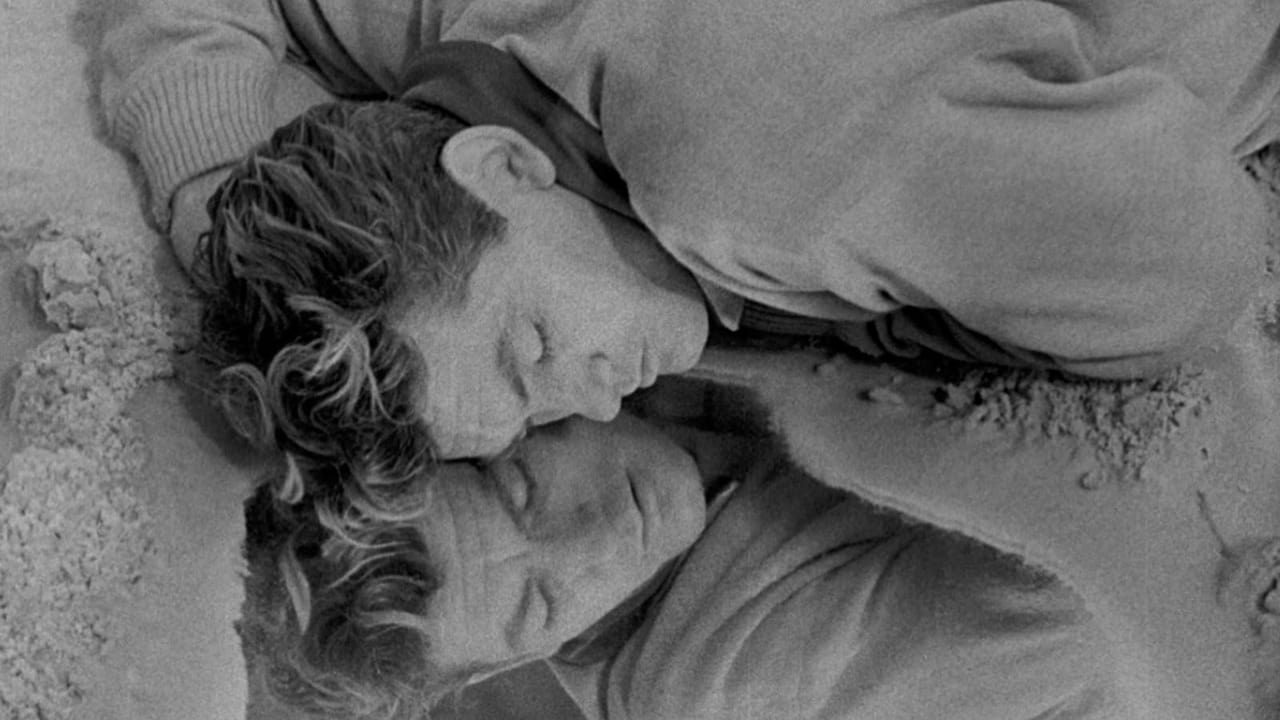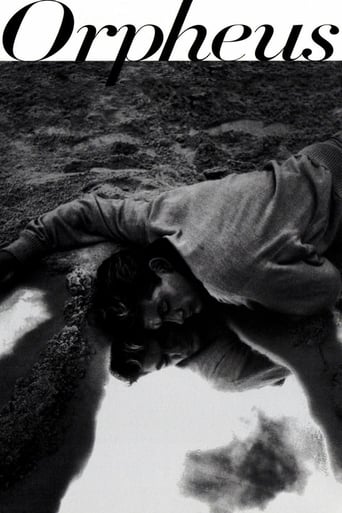

not poetic. only poetry. with deep roots in magic, proposing fields of questions, fascinating, reflecting the looking for real essence of reality by Jean Cocteau who propose a Jean Marais in his top of career. the love is its root and this is so obvious in each scene. and it is key for define it as a trip more than a movie. because large circle of feelings are ingredients of this story, so well known than becomes here total new. a film about yourself. that is "Orpheus". and a long trip in the heart of reality.
... View MoreIt's too bad that Cocteau's filmography is so short. In this film as well as Beauty and the Beast, there is so much visual delight that it makes one ask for more. Now granted this is a strange period historically, the post-war fifties with the beatnik milieu. It seems a bit dated now, especially the bad boy motorcycle guys, and that satanic council, but it still creates a world of great interest. The whole thing about poetry trumping everything is really interesting. The man sitting in the old Rolls, listening to the strange events on the radio as his accident-victim wife is breathing her last, this obsessiveness of the artist at all costs, plays pretty well. There are a couple of weaknesses. The woman representing death is rather dull, her presence is black but not the kind of black that launches fear. Also, apparently there is a hierarchy of these beings and she is but one. Marais is handsome and unpredictable in some ways, but not very likable at all; he is user. The kids from the restaurant are interesting. It's hard to imagine so much blood lust. They feel he is responsible for the death of their friend and has become a sellout to his constituents. There are some loose ends as well, but, overall, it's a striking piece of film-making.
... View MoreThe legend of Orpheus and Eurydice updated to 1950 (even though a narrator at the beginning tells us this is timeless). Orpheus (Jean Marais) doesn't care for his pregnant wife Eurydice (Marie Dea). He meets and falls in love with the beautiful princess (Maria Casares) who is actually death. In turn the chauffeur of death (Francois Perier) falls in love with Eurydice.People have said this is beautifully shot with surreal and lyrical images. That is most certainly true. Some of the imagery is astounding with special effects that (while obvious) are quite impressive for 1950. The raising up of the dead sequences are genuinely eerie. But the pace is very slow and I was getting bored quite a bit. There were beautiful moments but, in between, there were these obvious sequences that bought things to a screeching halt. A very attractive cast (especially Marais and Dea) help the movie through those dead spots. I was impressed and liked what I saw but no more than to give it a 7.
... View MoreWhat's this? A film directed by Jean Cocteau, my stated nemesis...that I liked? That I *gasp* really enjoyed? Why yes, and with the deck stacked against it, too. The story of Orpheus and Eurydice is one I know quite well, and I've exhibited a distaste for straightforward adaptations of works of literature I have an overt familiarity with. Great Expectations was point-and-shoot, and Olivier's Hamet put me to sleep. But Orpheus is a story conducive to imagination, a deadly serious flight of fancy that is almost wholly metaphorical, positively encouraging fantastical readings and unique characterization.In this version, Orpheus (Jean Marais) is a Parisian poet on the tail end of his "coolness" quotient, sneered at and dismissed by the hip young poets who want to replace him. They get into a fight, and this young guy gets killed. A car appears, carrying the Princess, Death (Maria Casares), and her chauffeur Heurtebise (Francois Perier), who retrieves the dead kid, and orders Orpheus to come along as a witness, and they descend into hell.Cocteau once again uses his small but effective bag of tricks, something that I did not neglect to praise in his Blood of a Poet and Beauty & the Beast, both of which I felt faltered on a more fundamental level, and here, the entrance to the underworld depicted in a combination of mirror and water looks great; the trek in the underworld an effect, while obvious, that still manages to affect the sort of offputting mysticality he is going for, and the simple conceit to run the camera backwards for reversals of fortune works just as well.Jean Marais (who I discovered not only was Cocteau's lover, but also played the Beast in his previous film, belatedly enforcing a stereotype, as I felt at the time that the Beast was almost comically effete) is much more at home here, although he (reasonably) has little chemistry with his wife (to be fair, she's dead for much of the film), and although it's not of a sexual nature, the most pleasant character-based scenes in the film are between Marais and the chauffeur Perier, who have an affable chemistry and a genial cross-play (both as actors and characters). Maria Casares was passable, but I kept wishing she would be more delicious, more decadent, more wicked, and she just didn't have the chops for it.All in all, my attention was committed throughout and I was delighted and surprised by how much I really enjoyed the film, considering the strikes against it. A worthwhile little gem that I recommend for anyone with an interest in French cinema, fantasy cinema, Greek myths in cinema, or really, just cinema.{Grade: 8.25/10 (B+/B) / #11 (of 19) of 1950}
... View More